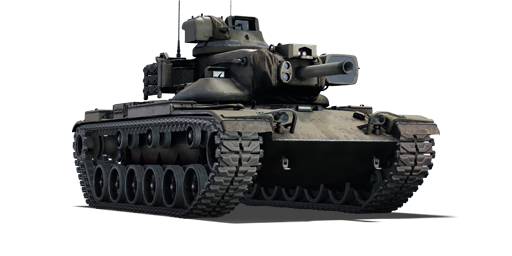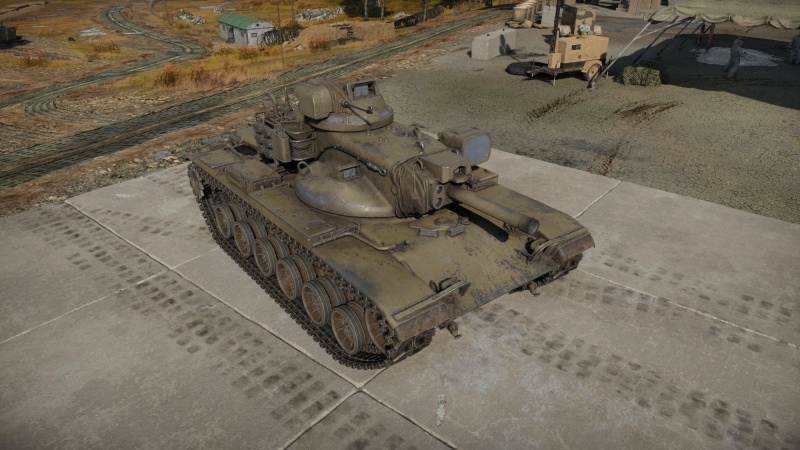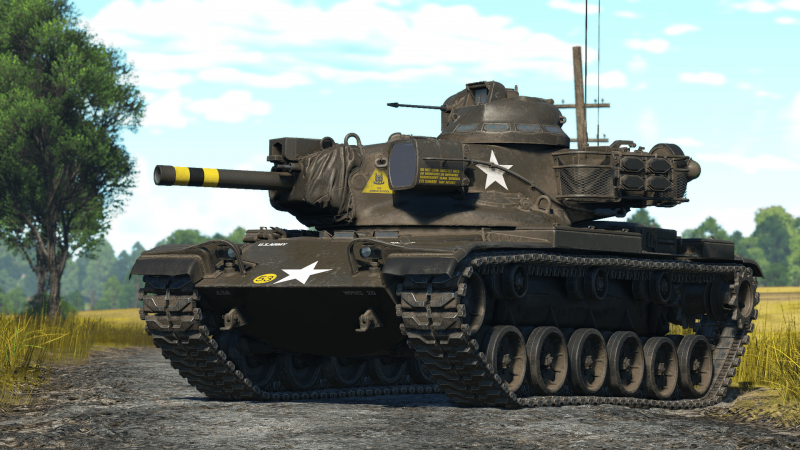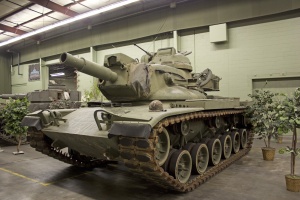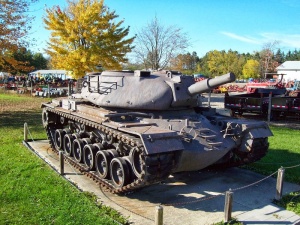Difference between revisions of "M60A2"
Colok76286 (talk | contribs) (Edits) |
(Tag: Visual edit) |
||
| (One intermediate revision by one other user not shown) | |||
| Line 11: | Line 11: | ||
== Description == | == Description == | ||
<!-- ''In the description, the first part should be about the history of the creation and combat usage of the vehicle, as well as its key features. In the second part, tell the reader about the ground vehicle in the game. Insert a screenshot of the vehicle, so that if the novice player does not remember the vehicle by name, he will immediately understand what kind of vehicle the article is talking about.'' --> | <!-- ''In the description, the first part should be about the history of the creation and combat usage of the vehicle, as well as its key features. In the second part, tell the reader about the ground vehicle in the game. Insert a screenshot of the vehicle, so that if the novice player does not remember the vehicle by name, he will immediately understand what kind of vehicle the article is talking about.'' --> | ||
| − | In the Cold War arms race for tank armaments, the US picked up an interest in developing an anti-tank guided missile as the main armament for tanks. As the M60 was coming into service, development started to create an ATGM armament for the tank with the goal of putting it into service by 1965. This developed into a 152 mm gun/launcher system that could fire conventional rounds or a Shillelagh missile system. Enthusiastic with the new weapon system, the US Army | + | In the Cold War arms race for tank armaments, the US picked up an interest in developing an anti-tank guided missile as the main armament for tanks. As the M60 was coming into service, development started to create an ATGM armament for the tank with the goal of putting it into service by 1965. This developed into a 152 mm gun/launcher system that could fire conventional rounds or a Shillelagh missile system. Enthusiastic with the new weapon system, the US Army aimed to have the weapon equip both their newest [[M551|airborne reconnaissance and assault vehicle]] and their [[MBT-70|main battle tanks]]. As a way to upgrade the existing M60 fleet with the new weapon system, the M60A1 would be converted to equip the system. A modified turret was provided to equip the gun/launcher system; however, the US Army's dream of a simple transition into the weapon system was trashed when complications with the system arose, especially in regards to the sensitive ammunition. While a limited production run was allowed with the tank designated as the '''M60A2''', but continued trouble with the tank and poor troop reception led to the M60A2's phasing out with only 526 units produced. |
| − | Introduced in [[Update 1.69 "Regia Aeronautica"]], the ''{{Specs|name}}''' | + | Introduced in [[Update 1.69 "Regia Aeronautica"]], the '''{{Specs|name}}''' is a rather unique vehicle with its gun/launcher system. Like on the [[M551|M551 Sheridan]], the weapon allows greater flexibility with blasting away lighter-armoured enemies with a 152 mm high-explosive shell to trigger an overpressure, or a HEAT round to penetrate steel armour, or the Shillelagh missile to inflict lethal blows to targets from range. However, unlike on the M551, the taller profile and platform of the M60A2 makes the weapon more difficult to employ as the M60A2 lacks the mobility and small size of the M551. Though the M60A2 is certainly more proof against enemy tank shells at its rank than the M551, it shouldn't be relied upon to stand up against a full-front attack from an enemy due to prominent weak points like the turret cupola. In short, the M60A2 can be a difficult weapon to employ, but can still present some opportunities if played to the weapon's strengths. |
== General info == | == General info == | ||
| Line 110: | Line 110: | ||
<!-- ''Describe the tactics of playing in the vehicle, the features of using vehicles in the team and advice on tactics. Refrain from creating a "guide" - do not impose a single point of view but instead give the reader food for thought. Describe the most dangerous enemies and give recommendations on fighting them. If necessary, note the specifics of the game in different modes (AB, RB, SB).'' --> | <!-- ''Describe the tactics of playing in the vehicle, the features of using vehicles in the team and advice on tactics. Refrain from creating a "guide" - do not impose a single point of view but instead give the reader food for thought. Describe the most dangerous enemies and give recommendations on fighting them. If necessary, note the specifics of the game in different modes (AB, RB, SB).'' --> | ||
| − | The M60A2 has suffered since the replacement of "Hull Break" with the "Overpressure" mechanic. The main drawback is its main armament, most notably the stock HEAT round. The HEAT round can penetrate the vast majority of targets, however the extremely poor post-penetration damage will not consistently destroy the target in one shot. The high-explosive fairs better due to being able to overpressure most targets (most notably Leopards, or anything resembling that design philosophy) with a single shot to the turret side, turret roof or hull. Before the Shillelagh missile is unlocked, it is recommended to use the high-explosive round as the primary ammunition, while keeping a few HEAT rounds on-hand for the more difficult-to-crack nuts such as the late-era Soviet/Russian heavies and the odd [[Maus]] heavy tank. One downside to consider is the long reload, which will make follow-up shots difficult if the enemy is still operational after the first shot. | + | The M60A2 has suffered since the replacement of "Hull Break" with the "Overpressure" mechanic. The main drawback is its main armament, most notably the stock HEAT round. The HEAT round can penetrate the vast majority of targets, however the extremely poor post-penetration damage will not consistently destroy the target in one shot. The high-explosive fairs better due to being able to overpressure most targets (most notably Leopards, or anything resembling that design philosophy) with a single shot to the turret side, turret roof or hull. Before the Shillelagh missile is unlocked, it is recommended to use the high-explosive round as the primary ammunition, while keeping a few HEAT rounds on-hand for the more difficult-to-crack nuts such as the late-era Soviet/Russian heavies and the odd [[Maus]] heavy tank. One downside to consider is the long reload, which will make follow-up shots difficult if the enemy is still operational after the first shot. |
Hitting the enemies can be made simpler with further researched modules, such as the laser rangefinder that allows automatic range adjustments for the distant targets. This can help with using the parabolic arc of the HEAT and HE rounds to hit enemies from behind cover with just the cupola visible, though this may not work consistently. The low velocity of the HEAT and HE rounds make hitting long-distance targets difficult, even with the range finder, but this can be alleviated by unlocking of the Shillelagh missile. Though the missile will increase the reload time by almost 20 seconds, the SACLOS missile guidance can make hitting distant and/or moving targets easier and can regularly trigger overpressure or detonate ammunition. The missile is easier to aim compared to the TOW missile also available at this BR as it is much more reactive and therefore the self-corrections the missile are much less likely to throw it off course. With some wrestling and careful adjustment it can be used to hit stationary aerial targets like helicopters. | Hitting the enemies can be made simpler with further researched modules, such as the laser rangefinder that allows automatic range adjustments for the distant targets. This can help with using the parabolic arc of the HEAT and HE rounds to hit enemies from behind cover with just the cupola visible, though this may not work consistently. The low velocity of the HEAT and HE rounds make hitting long-distance targets difficult, even with the range finder, but this can be alleviated by unlocking of the Shillelagh missile. Though the missile will increase the reload time by almost 20 seconds, the SACLOS missile guidance can make hitting distant and/or moving targets easier and can regularly trigger overpressure or detonate ammunition. The missile is easier to aim compared to the TOW missile also available at this BR as it is much more reactive and therefore the self-corrections the missile are much less likely to throw it off course. With some wrestling and careful adjustment it can be used to hit stationary aerial targets like helicopters. | ||
| Line 126: | Line 126: | ||
* Very fast turret rotation | * Very fast turret rotation | ||
| + | * Stabilizer gives fire-on-the-move capability and better reactivity compared to other ATGM vehicles ([[BMP-2|BMP]], [[Marder 1A3|Marder]], [[Warrior]]) | ||
| + | * ATGMs can be fired on the move | ||
| + | * Agile missile - can be used to attack helicopters | ||
* Turret front is hard to predictably penetrate due to its odd design | * Turret front is hard to predictably penetrate due to its odd design | ||
| + | * Armour is difficult for enemies to penetrate in a panic due to small weak spots | ||
* Has smoke launchers | * Has smoke launchers | ||
| − | * Same ammunition as the [[M551|M551 Sheridan]] | + | * Same ammunition as the [[M551|M551 Sheridan]] - familiar weaponry |
| − | |||
| − | |||
| − | |||
'''Cons:''' | '''Cons:''' | ||
| − | * | + | * Relatively poor mobility |
| − | * Cannot fire from cover like the [[IT-1]] or [[RakJPz 2|Raketenjagdpanzers]] | + | * Loud and distinctive engine tone |
| + | * Cupola is a large weak spot and fuses most APHE. | ||
| + | * Cannot fire from cover reliably like the [[IT-1]] or [[RakJPz 2|Raketenjagdpanzers]] | ||
| + | * Extremely long reload | ||
* Stock HEAT has extremely poor post-pen damage and seldom triggers overpressure | * Stock HEAT has extremely poor post-pen damage and seldom triggers overpressure | ||
| − | |||
* ATGM reload time is several seconds longer than normal ammunition | * ATGM reload time is several seconds longer than normal ammunition | ||
| + | * ATGM has a very low starting speed making it hard to hit moving targets at closer ranges | ||
* Can only hold 7 ATGMs total | * Can only hold 7 ATGMs total | ||
| − | |||
== History == | == History == | ||
Latest revision as of 08:48, 4 October 2024
| This page is about the American medium tank M60A2. For other uses, see M60 (Disambiguation). |
Contents
Description
In the Cold War arms race for tank armaments, the US picked up an interest in developing an anti-tank guided missile as the main armament for tanks. As the M60 was coming into service, development started to create an ATGM armament for the tank with the goal of putting it into service by 1965. This developed into a 152 mm gun/launcher system that could fire conventional rounds or a Shillelagh missile system. Enthusiastic with the new weapon system, the US Army aimed to have the weapon equip both their newest airborne reconnaissance and assault vehicle and their main battle tanks. As a way to upgrade the existing M60 fleet with the new weapon system, the M60A1 would be converted to equip the system. A modified turret was provided to equip the gun/launcher system; however, the US Army's dream of a simple transition into the weapon system was trashed when complications with the system arose, especially in regards to the sensitive ammunition. While a limited production run was allowed with the tank designated as the M60A2, but continued trouble with the tank and poor troop reception led to the M60A2's phasing out with only 526 units produced.
Introduced in Update 1.69 "Regia Aeronautica", the 152 mm Gun Tank M60A2 is a rather unique vehicle with its gun/launcher system. Like on the M551 Sheridan, the weapon allows greater flexibility with blasting away lighter-armoured enemies with a 152 mm high-explosive shell to trigger an overpressure, or a HEAT round to penetrate steel armour, or the Shillelagh missile to inflict lethal blows to targets from range. However, unlike on the M551, the taller profile and platform of the M60A2 makes the weapon more difficult to employ as the M60A2 lacks the mobility and small size of the M551. Though the M60A2 is certainly more proof against enemy tank shells at its rank than the M551, it shouldn't be relied upon to stand up against a full-front attack from an enemy due to prominent weak points like the turret cupola. In short, the M60A2 can be a difficult weapon to employ, but can still present some opportunities if played to the weapon's strengths.
General info
Survivability and armour
The M60A2 shares the hull with the other M60 variants. That means that the front hull armour is sufficient to stop 100 mm/105 mm kinetic ammunition of the same tier, while it does not protect you against hollow charge shells with a calibre of 90 mm and above. It also has the same 114 mm thick turret base, which is a weak point. The centre part of the turret is a cast 220 mm plate in front of the cannon breech, which while not thick enough to protect you against any shells of even outdated guns, often eats shots (at cost of the cannon breech). The outer parts of the turret are significantly lower than the breech and rounded like in most post war soviet tanks. If not hit head-on, these sides can bounce most of the incoming shots. On top of the turret is a massive cupola for the commander, which is a big weak spot and often gets your commander knocked out, even the whole tank if your opponent is firing shells with explosive filler. The side armour on the hull is thick enough to withstand cannon fire of up to 25 mm (excluding APDS and the part around the gearbox), while cannons with a calibre of up to 40 mm will have significant problems and the tank may withstand a large number of shells. It will however not stop shells fired out of cannons of equal tier. The back of the hull can even be penetrated by HMGs. The turret side is around the cannon is 120-140 mm thick and will resist most shots if angled. The lower part however will most likely get penetrated often due to the reduced thickness the further towards the turret back you get. The hull is completely filled with ammunition, ammo is placed to the left, right and behind the driver (which is sitting in the middle of the front hull). Taking a reduced amount of shells is therefore advisable. The crew is well spaced, a solid shot in the front turret will likely only knock out a single crew member, since all crew members sit next to each other and not behind each other like in most other tanks, but this obviously increases the chance to get destroyed due to a side-shot. Overall the armour will not completely protect you, but you have good chances to eat a bigger amount of shells than most other tanks.
Mobility
The mobility of the vehicle is average for its tier. With a top speed of 48 km/h (RB) and -11 km/h in reverse, it is not as fast as other tanks like the Leopard 1, but fast enough to get where you want quickly. The manoeuvrability is average to bad: you lose a lot of speed while turning. You can, however, turn on the spot thanks to neutral steering.
| Game Mode | Max Speed (km/h) | Weight (tons) | Engine power (horsepower) | Power-to-weight ratio (hp/ton) | |||
|---|---|---|---|---|---|---|---|
| Forward | Reverse | Stock | Upgraded | Stock | Upgraded | ||
| Arcade | 53 | 10 | 51.9 | 1,162 | 1,431 | 22.39 | 27.57 |
| Realistic | 48 | 9 | 663 | 750 | 12.77 | 14.45 | |
Modifications and economy
Armaments
Main armament
When firing from hull-down positions with the Shillelagh, the user must be extremely careful of how close the cannon is from the ground. If the tank is too close, the missile will dip after firing and hit the ground. The user should practice pointing up before firing and quickly acquiring the target again to avoid this. It is especially important for the M60A2, as the small amount of missiles carried (only seven rounds) can easily be wasted.
| 152 mm M162 | Turret rotation speed (°/s) | Reloading rate (seconds) | |||||||||||
|---|---|---|---|---|---|---|---|---|---|---|---|---|---|
| Mode | Capacity | Vertical | Horizontal | Stabilizer | Stock | Upgraded | Full | Expert | Aced | Stock | Full | Expert | Aced |
| Arcade | 46 | -10°/+20° | ±180° | Two-plane | 38.1 | 52.7 | 64.0 | 70.8 | 75.3 | 15.60 | 13.80 | 12.72 | 12.00 |
| Realistic | 23.8 | 28.0 | 34.0 | 37.6 | 40.0 | ||||||||
Ammunition
| Penetration statistics | |||||||
|---|---|---|---|---|---|---|---|
| Ammunition | Type of warhead |
Penetration @ 0° Angle of Attack (mm) | |||||
| 10 m | 100 m | 500 m | 1,000 m | 1,500 m | 2,000 m | ||
| M409A1 | HEAT | 380 | 380 | 380 | 380 | 380 | 380 |
| M657A2 | HE | 38 | 38 | 38 | 38 | 38 | 38 |
| MGM-51B Shillelagh | ATGM | 431 | 431 | 431 | 431 | 431 | 431 |
| Shell details | ||||||||||||
|---|---|---|---|---|---|---|---|---|---|---|---|---|
| Ammunition | Type of warhead |
Velocity (m/s) |
Projectile mass (kg) |
Fuse delay (m) |
Fuse sensitivity (mm) |
Explosive mass (TNT equivalent) (kg) |
Ricochet | |||||
| 0% | 50% | 100% | ||||||||||
| M409A1 | HEAT | 682 | 18.9 | 0.05 | 0.1 | 3.73 | 62° | 69° | 73° | |||
| M657A2 | HE | 682 | 22 | 0 | 0.1 | 4.3 | 79° | 80° | 81° | |||
| Missile details | ||||||||||||
|---|---|---|---|---|---|---|---|---|---|---|---|---|
| Ammunition | Type of warhead |
Velocity (m/s) |
Range (m) |
Projectile mass (kg) |
Fuse delay (m) |
Fuse sensitivity (mm) |
Explosive mass (TNT equivalent) (kg) |
Ricochet | ||||
| 0% | 50% | 100% | ||||||||||
| MGM-51B Shillelagh | ATGM | 286 | 3,200 | 27.8 | 0 | 0.1 | 3.6 | 80° | 82° | 90° | ||
Ammo racks
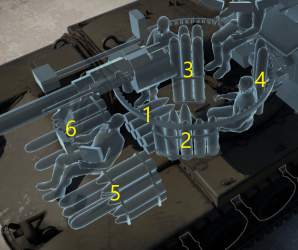
| Full ammo |
1st rack empty |
2nd rack empty |
3rd rack empty |
4th rack empty |
5th rack empty |
6th rack empty |
Visual discrepancy |
|---|---|---|---|---|---|---|---|
| 46 | 39 (+7) | 32 (+14) | 27 (+19) | 25 (+21) | 12 (+34) | 1 (+45) | No |
Notes:
- Empty turret: 25 (+21) shells.
Machine guns
The M60A2 is equipped with a coaxial 7.62 mm LMG and a 12.7 mm HMG on top of the turret. Like on most American vehicles, this allows you to engage lightly armoured vehicles and slow aeroplanes at close to medium ranges.
| 12.7 mm M85 | ||||
|---|---|---|---|---|
| Mount | Capacity (Belt) | Fire rate | Vertical | Horizontal |
| Pintle | 1,260 (180) | 626 | -15°/+60° | ±180° |
| 7.62 mm M73 | ||||
|---|---|---|---|---|
| Mount | Capacity (Belt) | Fire rate | Vertical | Horizontal |
| Coaxial | 5,500 (250) | 500 | N/A | N/A |
Usage in battles
The M60A2 has suffered since the replacement of "Hull Break" with the "Overpressure" mechanic. The main drawback is its main armament, most notably the stock HEAT round. The HEAT round can penetrate the vast majority of targets, however the extremely poor post-penetration damage will not consistently destroy the target in one shot. The high-explosive fairs better due to being able to overpressure most targets (most notably Leopards, or anything resembling that design philosophy) with a single shot to the turret side, turret roof or hull. Before the Shillelagh missile is unlocked, it is recommended to use the high-explosive round as the primary ammunition, while keeping a few HEAT rounds on-hand for the more difficult-to-crack nuts such as the late-era Soviet/Russian heavies and the odd Maus heavy tank. One downside to consider is the long reload, which will make follow-up shots difficult if the enemy is still operational after the first shot.
Hitting the enemies can be made simpler with further researched modules, such as the laser rangefinder that allows automatic range adjustments for the distant targets. This can help with using the parabolic arc of the HEAT and HE rounds to hit enemies from behind cover with just the cupola visible, though this may not work consistently. The low velocity of the HEAT and HE rounds make hitting long-distance targets difficult, even with the range finder, but this can be alleviated by unlocking of the Shillelagh missile. Though the missile will increase the reload time by almost 20 seconds, the SACLOS missile guidance can make hitting distant and/or moving targets easier and can regularly trigger overpressure or detonate ammunition. The missile is easier to aim compared to the TOW missile also available at this BR as it is much more reactive and therefore the self-corrections the missile are much less likely to throw it off course. With some wrestling and careful adjustment it can be used to hit stationary aerial targets like helicopters.
Without any mobility upgrades, the M60A2 also struggles to keep up with most of its contemporaries. It is reasonably quick, however the extra weight makes its acceleration poor and will hinder you in reaching powerful positions. Another noticeably poor characteristic is the neutral-steer, with the vehicle struggling to turn on slopes or any form of defilade. However, despite the poor mobility, it performs quite well in close-quarters. The reverse gear is slow, but is still good enough to get the vehicle out of danger after peeking and firing a shot. The turret rotation is also quite good, especially for the size of the cannon which means that the Starship can hold its own in close-quarters.
Due to the odd shape of the turret, and the hull being inherited from the M60 platform, the Starship can be rather difficult for some opposing vehicles to destroy it. For example, from the front, common foes such as the Leopard 1 and other M60s firing kinetic rounds will struggle to effectively deal damage. However, it is not invincible. The turret neck is a large weak spot and can be penetrated by the even Tiger II. Not only this, but the large commanders cupola will fuse most APHE rounds and funnel them down into the turret, or (in the case of the Russian BR-412 round found on most Russian mediums at the BR) overpressure the vehicle. The hull is still penetrable by most common HEAT rounds, as is the turret, though its odd shape may make it difficult to consistently knock out all the turret crew in one shot.
Overall, the M60A2 is a hardy vehicle, but struggles when it is not supported and/or fighting heavily armoured vehicles. The M60A2 can be a rather useful asset for brawling with its one-hit potential, but the long reload and inconsistent nature of the shells it fires can make it difficult to consistently work around. It can be useful for long-arming shells or sniping with the missile but its poor mobility makes some useful positions inaccessible.
Pros and cons
Pros:
- Very fast turret rotation
- Stabilizer gives fire-on-the-move capability and better reactivity compared to other ATGM vehicles (BMP, Marder, Warrior)
- ATGMs can be fired on the move
- Agile missile - can be used to attack helicopters
- Turret front is hard to predictably penetrate due to its odd design
- Armour is difficult for enemies to penetrate in a panic due to small weak spots
- Has smoke launchers
- Same ammunition as the M551 Sheridan - familiar weaponry
Cons:
- Relatively poor mobility
- Loud and distinctive engine tone
- Cupola is a large weak spot and fuses most APHE.
- Cannot fire from cover reliably like the IT-1 or Raketenjagdpanzers
- Extremely long reload
- Stock HEAT has extremely poor post-pen damage and seldom triggers overpressure
- ATGM reload time is several seconds longer than normal ammunition
- ATGM has a very low starting speed making it hard to hit moving targets at closer ranges
- Can only hold 7 ATGMs total
History
Design
The M60A2 used the Type B turret which featured an unconventional low profile design. The turret base was disc shaped and was very low profile, while the center part was much larger and consisted of a lane running front to rear that mounted the gun breech and behind that the commander's position. The gunner was seated under the disc portion of the right side of the turret, while the loader was located on the opposite side under the disc portion. The commander was located in a rotating cupola at the rear of the center part of the turret. The turret received an interior Kevlar spall liner. A basket was mounted to the rear of the turret for stowage. A bank of four M226 smoke grenades is located on each side of the turret for a total of eight smoke grenade launchers. Additionally, a xenon white light or infrared spotlight could be fitted to the left of the gun for night operations.
The M60A2's main armament consisted of a two-plane stabilized 152 mm M162 gun/launcher mounted in the center part of the turret. The M162 could fire both HE and HEAT conventional rounds as well as the MGM-51 Shillelagh ATGMs. The HE rounds were used against enemy infantry or emplacements, the HEAT rounds were used against enemy armour at close range (it had an effective range of 1.5 km), and the ATGMs were used against enemy armour at longer ranges of up to 3 km for the MGM-51B and C variants. 33 conventional rounds and 13 missiles could be carried in the tank.
Testing of the weapon system found a number of issues. Notably, there were a number of misfires and premature detonations caused by leftover propellant in the gun barrel and breech. As such, a fume extractor was fitted which was later replaced by a Closed Bore Scavenger System (CBSS) which used compressed air to push the fumes out of the gun.
Secondary armament of the M60A2 consisted of two machine guns. One was a coaxial 7.62 mm M73 machine gun and the other was a 12.7 mm M85 machine gun in the commander's cupola. These were later replaced by the 7.62 mm M240 and 12.7 mm M2HB Browning respectively. 5,560 rounds of 7.62 mm ammunition and 1,080 rounds of 12.7 mm ammunition were carried.
The M60A2 received the M51 Missile Guidance System (MGS), produced by Ford's Aerospace Division. The M51 MGS included an AN/WG-1 ruby laser rangefinder as well as an infrared beam system for control of the MGM-51 Shillelagh ATGMs. The MGM-51 was guided after launch by IR beam which the gunner had to keep on the target (by way of his aiming sight) the entire flight in order to hit the target. The M60A2 was one of if not the very first production tank used by the US Army to include a laser rangefinder. The laser rangefinder allowed accurate ranging of the target up to 4,000 meters to provide the gunner with a firing solution. On the other hand, the laser rangefinder was ineffective at night and was only accurate out to 600 meters at 25% moonlight.
The hull of the M60A2 was originally identical to that of the M60A1. It was powered by a 750 horsepower Continental AVDS-1790-2A engine coupled to the General Motors CD-850-5 cross-drive transmission with two forward and one reverse gear, allowing the M60A2 to reach a top speed of 48 km/h. It used the standard T97 track assembly. Many M60A2s were later upgraded to the RISE standard with an improved AVDS-1790-2C engine and T142 tracks.
Production and Service
After the M60A1E2 prototype was designated as the Tank, Combat, Full Tracked: 152-mm Gun/Launcher, M60A2 in 1970, the US Army ordered the M60A2 in 1971. Production lasted from 1973 to 1975 with the total production of the M60A2 at 540, all of which were produced at the Chrysler Tank Plant in Warren, Michigan.
The first US Army unit to receive its M60A2 tanks was the B Company, 1st Battalion, 32 Armor Battalion in June 1975.
Ultimately the M60A2 tank was a failure, mostly down to the weapon system. The MGM-51 Shillelagh proved to be an extremely expensive and problematic system due to its advanced technology. There were issues with the propellant as well as the tracking and guidance systems. Not only this, but the fact that the MGM-51 was the only anti-tank weapon at range limited the anti-tank role of the M60A2 greatly; the gunner had to keep the target in his sight during the entire flight of the ATGM from the gun barrel to the impact point. Additionally, the MGM-51 ATGM could not be fired while on the move despite the fully stabilized gun, as well as the fact that the MGM-51 was much more expensive than a conventional round.
These issues, among others, contributed to a poor opinion of the tank by the US Army. The M60A2 even gained the unofficial nickname of "Starship" due to its unconventional turret appearance and advanced technology. The M60A2 was removed completely from service by 1981. Many former M60A2s had their turret removed and replaced by the more conventional M60A3 turret and were put back into service. M60A2s were also converted to noncombat variants in 1985, including the M60A1 AVLB bridge layer and the M60 Panther MDCV mine-clearing vehicle. Many M60A2s were also converted to the M728A1 CEV (combat engineering vehicle) variant as well.
The M60A2 was never cleared for export.
Variants
- XM66 - Designation for Type A, B, and C turret concepts.
- M60A1E1 - M60E1 hulls with Type A turret fitted with XM81 gun/launcher.
- M60A1E2 - M60A1 hull with Type B turret fitted with XM81E13 gun/launcher. The M60A1E2 was accepted for service, with modifications, as the M60A2.
- M60A1E3 - M60A1E2 experimentally fitted with 105 mm M68E1 rifled gun.
- M60A1E4 - Concept of M60 hull fitted with Type C turret with remote weapons system. Only a turret mock-up was built.
- M60A2 - Production version of the M60A1E2, fitted with M162 gun/launcher and received minor modifications such as a laser rangefinder.
Media
- Skins
- Videos
See also
Links to the articles on the War Thunder Wiki that you think will be useful for the reader, for example:
- reference to the series of the vehicles;
- links to approximate analogues of other nations and research trees.
External links
Paste links to sources and external resources, such as:
- topic on the official game forum;
- other literature.
| Chrysler Defense | |
|---|---|
| MBTs | |
| M48 Patton | M48A1 |
| M60 | M60 · M60A1 (AOS) · M60A2 · M60A1 RISE (P) · M60A3 TTS |
| M1 | XM1 (Chrysler) · M1 Abrams |
| Export | |
| M48 | M48A2 C · M48A2 G A2 · ␗M48A1 · Magach 1 · Magach 2 |
| M60 | ␗M60A3 TTS · M60A1 "D.C.Ariete" · |
| Note | Chrysler Defense was purchased by General Dynamics Land Systems (GDLS) in 1982. |
| USA medium tanks | |
|---|---|
| M2 | M2 |
| M3 | M3 Lee · ▃Grant I |
| M4 | M4 · Calliope · M4A1 · M4A1 (76) W · M4A2 · M4A2 (76) W · M4A3 (105) · M4A3 (76) W · M4/T26 |
| M26 Pershing | T20 · T25 · M26 · M26 T99 · M26E1 |
| M46/47/48 Patton | M46 · M46 "Tiger" · M47 · M48A1 · T54E1 · T54E2 |
| M60 | M60 · M60A1 (AOS) · M60A1 RISE (P) · M60A2 · M60A3 TTS · M728 CEV · 120S |
| MBT-70 | MBT-70 · XM803 |
| M1 Abrams | XM1 (Chrysler) · XM1 (GM) |
| M1 Abrams · M1 KVT · IPM1 | |
| M1A1 · M1A1 HC · M1A1 Click-Bait | |
| M1A2 Abrams · M1A2 SEP · M1A2 SEP V2 | |
| Other | T95E1 |
| Australia | M1A1 AIM |
| Canada | M4A5 |
| Israel | ▃Magach 3 (ERA) · ▃Merkava Mk.1 · ▃Merkava Mk.2B · ▃Merkava Mk.3D |
| Turkey | M60 AMBT |


